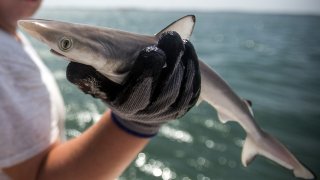
More than 10 sharks in waters off the coast of Brazil tested positive for cocaine, according to a first-of-its-kind study.
The study dubbed "Cocaine Shark" examined the cocaine and benzoylecgonine levels in 13 Brazilian sharpnose sharks from coastal waters near Rio de Janeiro. The small adult sharks measured roughly 20 inches on average.
Watch NBC6 free wherever you are
>Each of the 13 dissected sharks tested positive for cocaine and all but one tested positive for benzoylecgonine, which is the main metabolite of cocaine. Cocaine and benzoylecgonine were detected in the sharks' muscles and livers.
The cocaine concentrations found in the sharks were roughly three times as high as the benzoylecgonine concentrations. Additionally, the cocaine levels detected in the muscles were about three times higher compared to those in the liver.
Get local news you need to know to start your day with NBC 6's News Headlines newsletter.
>The overall concentration levels were as much as 100 times higher than previously reported for other aquatic creatures, according to Science Magazine.
The health of the sharks wasn't examined as part of the study, but researchers did say negative effects from the drug are "probable" based on previous studies, per National Geographic. It's unclear what kind of effect, if any, cocaine has on shark behavior.
Experts believe cocaine is entering the ocean near Rio de Janeiro via drainage from illegal drug labs and via untreated sewage from drug users, per Science Magazine. Traffickers losing or dumping packs of cocaine at sea is believed to be another potential, though less likely, source.
U.S. & World
The researchers called for additional testing in order to determine exactly where the cocaine is coming from, according to Science Magazine.
The study was conducted by the Oswaldo Cruz Foundation and published in the Science of The Total Environment journal. It claims to be the first report on cocaine and benzoylecgonine detection in free-ranging sharks.



